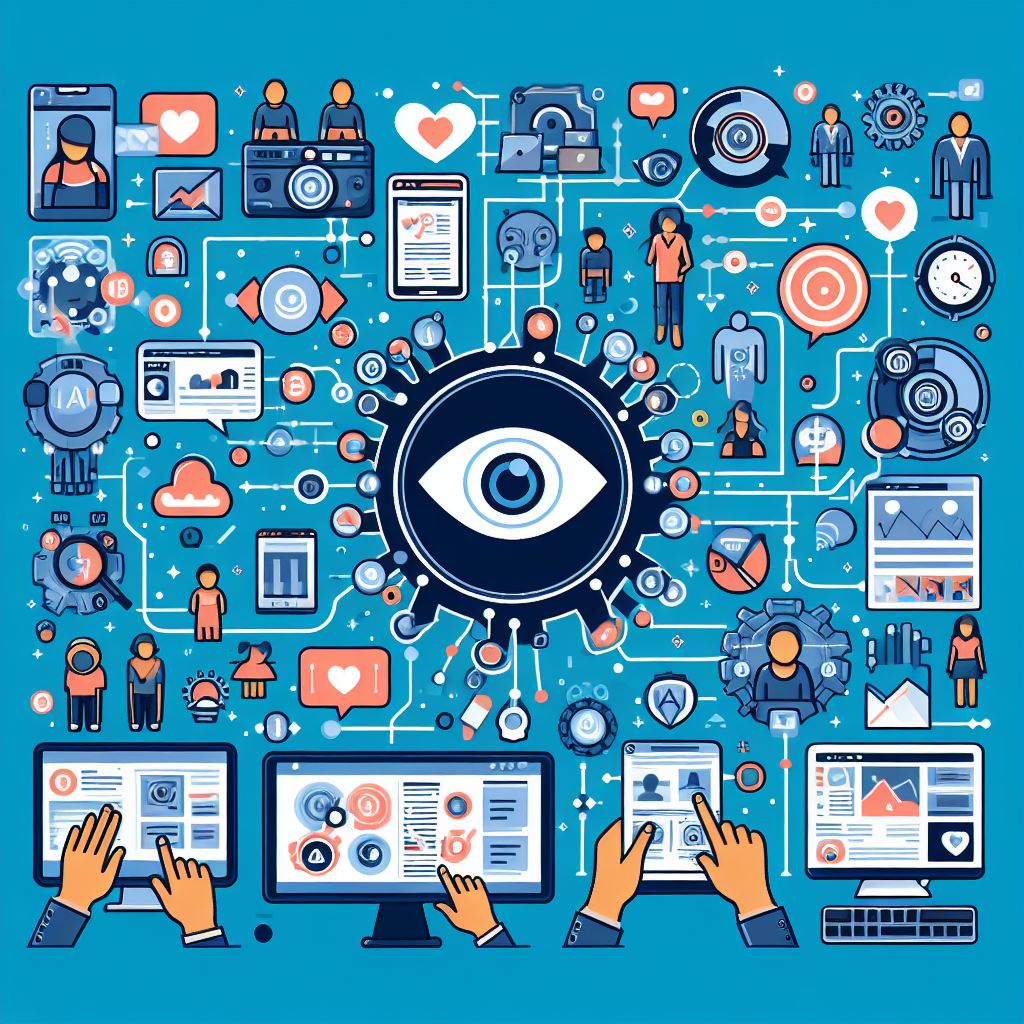Introduction
In today’s era the blending of Artificial Intelligence (AI), with social media has completely changed how we engage, communicate and view content on the internet. AI algorithms have revamped social media platforms by providing tailored suggestions and automated customer support to meet the preferences and requirements of billions of users. This collaborative bond between AI and social media does not enrich user interactions. Also revolutionizes marketing tactics, content moderation and data analysis.
Nonetheless while reaping its advantages the incorporation of AI in social media prompts important discussions about privacy issues. Biased algorithms and the ethical considerations are linked to AI driven decision making. This explores how Artificial Intelligence impacts social media, examining its effects on individuals, businesses, and society. Social media channels are experiencing a shift influenced by intelligence (AI). AI systems play a role in shaping the content you view and your online interactions, with others.
Content Personalization
When you are browsing a site or watching you tube or you are scrolling through Instagram, you will notice that you are seeing posts or ads based on how long you have been on the site, reel etc. This is achieved using AI.
When integrating Artificial Intelligence (AI) into media platforms it is crucial to prioritize protecting user privacy and data. Social media users share information, on these platforms including profile details, preferences, behaviors and interactions. With AI algorithms playing a role in analysing this data for tasks like providing recommendations and targeted advertisements ensuring user privacy becomes paramount.
To tackle these issues social media companies should establish privacy policies that detail how user data is collected, processed and utilized by AI systems. Users need to be well informed about the types of data being collected its intended purposes and the security measures in place to safeguard their privacy. This also involves empowering users to control their data by opting out of practices or adjusting their privacy settings according to their preferences.
Moreover, robust security measures must be put in place to prevent access, data breaches and misuse of user information. This includes implementing encryption techniques, storage protocols, regular security assessments and adhering to data protection regulations such as the General Data Protection Regulation (GDPR) in Europe or the California Consumer Privacy Act (CCPA), in the United States or Digital Personal Data Protection Act in India.
Using AI for social media marketing – Refer link
AI driven chatbots
AI-powered virtual assistants have become integral to customer support strategies on social media platforms. They elevate user experiences and expedite response times for inquiries and issues. These assistants employ natural language processing (NLP) and machine learning to understand and respond to user questions promptly, creating interactions that mimic human conversation. By providing support, they ensure users receive timely answers to their queries, regardless of the time of day or request volume.
A significant benefit of AI-driven assistants is their ability to efficiently handle various questions. Whether users need product details, troubleshooting tips, or account assistance, these assistants can quickly interpret the query’s context and offer solutions. This not only enhances user satisfaction by addressing concerns but also reduces the workload on human customer service representatives, allowing them to focus on more complex or specialized tasks.
Moreover, AI-powered virtual assistants provide a consistent user experience across different platforms and channels. Whether users engage with them through social media, chat apps, websites, or mobile apps, they can expect consistent responses and personalized assistance that meets their needs. This consistency is crucial in building brand loyalty and trust, as users rely on chatbots to provide accurate information whenever they seek assistance.
Additionally, AI-powered chatbots can continuously learn and improve their performance through user interactions. By analysing feedback and engagements, chatbots can identify trends, refine their responses, and adapt to changing user preferences. This ongoing learning process ensures that chatbots become increasingly effective and efficient in providing support over time, ultimately enhancing the user experience.
In summary, AI-driven chatbots are vital components of customer service strategies on social media platforms, offering support and enhancing user experiences.
Data Analysis
AI algorithms analyze the vast data produced on social media platforms to detect trends, conduct sentiment analysis, and discern patterns in user behavior.
- Trend Identification:
- AI algorithms sift through massive volumes of data to detect emerging trends and topics of discussion on social media platforms.
- By analyzing patterns in user interactions, hashtags, and content engagement, AI can identify trending topics in real-time.
- Sentiment Analysis:
- AI-powered sentiment analysis tools analyze the tone and sentiment of social media conversations, comments, and posts.
- These algorithms can determine whether user sentiments are positive, negative, or neutral, providing valuable insights into public opinion and brand perception.
- User Behavior Patterns:
- AI algorithms track and analyze user behavior patterns on social media platforms, such as posting frequency, content preferences, and engagement habits.
- By identifying recurring behaviors and preferences, AI can help businesses tailor their content and marketing strategies to better resonate with their target audience.
- Audience Segmentation:
- AI-driven data analysis facilitates the segmentation of social media audiences by demographic, geographic, and psychographic factors.
- The segmentation permits businesses to tailor their content and advertisements to specific audience segments, thereby optimizing the impact of their marketing efforts.
- Predictive Analytics:
- Predictive modelling techniques are an outcome of AI algorithms which utilizes historical data to forecast future trends and user behaviours on social media platforms.
- Businesses are able to capitalize on emerging opportunities and proactively adjust their strategies by predicting upcoming trends and behaviours.
- Anomaly Detection:
- Sudden spikes in activity or unexpected changes in behaviour are easily detected by AI algorithms.
- With the help of such detection, businesses can identify potential threats, crises, or opportunities that require immediate attention or response.
- Insights Generation:
- Data on social media is used by AI-powered data analysis techniques to generate actionable insights and recommendations.
- Business use these insights to make informed decisions, optimize their strategies, and enhance their overall performance on social media platforms.

Deepfake detection
AI is being used to detect and flag manipulated with the rise of deepfake technology or fake content to prevent its spread on social media platforms.
- Deepfake Technology:
- Artificial intelligence techniques such as deep learning is used to create highly realistic but fake audio, video or images.
- With the use of deepfake techniques and technology media can be manipulated to spare misinformation, deceive users or manipulate public opition.
- Detection Techniques:
- With deepfake on the rise, AI algorithms are developed to analyze and identify subtle inconsistencies or artifacts present in deepfake content.
- Anomalies can be detected using techniques such as facial recognition, voice analysis, and digital forensics which are indicative of deepfake manipulation.
- Behavioral Analysis:
- AI-powered systems analyze the behavioral patterns of social media users to identify suspicious activities associated with the dissemination of deepfake content.
- This includes monitoring for rapid dissemination of content, unusual engagement patterns, or suspicious user accounts involved in spreading manipulated media.
- Content Verification:
- AI algorithms compare the content of media files against known databases of authentic sources to verify their authenticity.
- By cross-referencing metadata, timestamps, and contextual information, AI can determine whether media content has been tampered with or manipulated.
- Real-Time Monitoring:
- Social media platforms employ AI-driven systems for real-time monitoring and detection of deepfake content as it is uploaded and shared.
- Automated tools continuously scan for suspicious media content and flag potentially manipulated or fake content for further review by human moderators.
- Collaborative Efforts:
- Collaboration between tech companies, researchers, and policymakers is essential for developing and deploying effective deepfake detection technologies.
- Shared datasets, research initiatives, and collaborative platforms facilitate the development of more robust and accurate AI algorithms for deepfake detection.
- User Education:
- Educating social media users about the existence and risks of deepfake technology is crucial for promoting awareness and critical thinking.
- AI-driven systems can be used to identify and label potentially manipulated media, empowering users to make informed decisions about the content they consume and share.
- Ethical Considerations:
- While deepfake detection technologies serve to mitigate the spread of manipulated content, ethical considerations such as privacy protection and freedom of expression must be upheld.
- Balancing the need for content moderation with respect for user rights and freedoms is essential in the development and deployment of deepfake detection solutions.
Ethical considerations
Privacy Concerns: AI-driven data analysis raises concerns about user privacy and data protection, leading to debates about the ethical use of AI in social media.
- Data Collection Practices:
- User data is collected from social media platforms, browsing history and interactions which is then used by AI techniques to drive data analysis.
- Concerns arise regarding the transparency and consent mechanisms surrounding data collection practices, as users may not fully understand the extent to which their data is being harvested and analysed.
- Data Security Risks:
- Security risks such as data breaches, unauthorized access and misuse of sensitive information are a result of storage and processing of large datasets for AI-driven analysis.
- Data security measures such as encryption, access control and regular security audits must be implemented by social media companies.
- Algorithmic Transparency:
- The opacity of AI algorithms used for data analysis raises concerns about transparency and accountability in decision-making processes.
- Users may not understand how AI algorithms analyze their data or make recommendations, leading to distrust and skepticism regarding the fairness and accuracy of AI-driven systems.
- Risk of Profiling and Discrimination:
- AI-driven data analysis can inadvertently lead to user profiling and discrimination based on factors such as race, gender, or socioeconomic status.
- Biases present in training data or algorithmic decision-making processes may result in unfair treatment or exclusion of certain demographic groups, exacerbating existing inequalities in society.
- Informed Consent and Control:
- Users’ personal data should be utilized for AI drive analysis only after informed consent and control over the collection and use.
- Social media platforms must provide clear and accessible privacy settings, opt-out mechanisms, and user controls to empower users to manage their privacy preferences and protect their data.
- Regulatory Compliance:
- Policy makers are working towards bringing in strong regulator frameworks to govern the ethical use of AI and protect user privacy.
- Legislation such as the General Data Protection Regulation (GDPR) in Europe and the California Consumer Privacy Act (CCPA) in the United States and Digital Personal Data Protection Act in India imposes requirements on social media companies to ensure transparency, accountability, and user rights regarding data privacy.
- Ethical Considerations:
- Debates surrounding the ethical use of AI in social media highlight the need to balance innovation and technological advancement with ethical principles such as privacy, fairness, and accountability.
- Social media companies must navigate these ethical considerations to ensure that AI-driven data analysis benefits users while upholding their rights and freedoms in the digital age.
For careers related to social media, visit my blog
Ad Targeting
Ad Targeting: AI helps in targeting advertisements more effectively by analysing user demographics, interests, and online behaviour, resulting in higher conversion rates for advertisers.
- User Data Analysis:
- Targeted and personalized advertising campaigns are scheduled because AI algorithms analyze a wealth of user data collected from social media platforms, including demographics, interests, browsing history, and interactions.
- Segmentation and Personalization:
- AI-powered segmentation techniques categorize users into distinct groups based on shared characteristics, allowing advertisers to tailor their ad content and messaging to specific audience segments.
- Personalized advertisements resonate more effectively with users, leading to higher engagement rates and increased conversion opportunities.
- Behavioural Targeting:
- Search queries, website visits and social media interactions are used in AI algorithms to track and analyse user behaviour patterns and push relevant advertising opportunities.
- By understanding user intent and context, AI can deliver advertisements that align with users’ interests and preferences, increasing the likelihood of conversion.
- Dynamic Ad Optimization:
- AI enables dynamic ad optimization by continuously monitoring campaign performance and adjusting ad content, targeting criteria, and bidding strategies in real-time.
- This iterative approach ensures that advertisements are continually refined and optimized to maximize effectiveness and return on investment for advertisers.
- Predictive Analytics:
- AI-driven predictive analytics forecast future user behavior and preferences based on historical data, enabling advertisers to anticipate and capitalize on emerging trends and opportunities.
- By leveraging predictive models, advertisers can optimize ad targeting strategies and allocate resources more efficiently to reach their target audience effectively.
- Cross-Channel Integration:
- AI facilitates cross-channel integration by unifying user data from multiple touchpoints, including social media platforms, websites, mobile apps, and offline interactions.
- This holistic view of user engagement enables advertisers to deliver cohesive and coordinated advertising experiences across various channels, enhancing brand visibility and recognition.
- Ethical Considerations:
- While AI-driven ad targeting offers significant benefits for advertisers, ethical considerations regarding user privacy, consent, and data protection must be carefully considered.
- Advertisers must uphold ethical principles and regulatory compliance to ensure transparency, fairness, and respect for user rights in their advertising practices.
Take away
Artificial Intelligence is touching every nook and cranny of our lives. We get up in the morning and look at social media posts. There is lot of information out there which can be good and bad for us. It is important to be aware and ensure that we are not leaking out information that can be mis-used.
From a social media standpoint, Artificial Intelligence is re-shaping the industry by way making things available at a faster pace, analytics to support the theory, ethical considerations to be prioritized and protect the privacy of the users.
FAQs
- How is AI reshaping social media?
- AI is reshaping social media by improving content recommendation systems, enhancing user engagement through personalized interactions, and optimizing advertising targeting strategies based on user behavior and preferences.
- What are some examples of AI in social media?
- Examples of AI in social media include personalized content recommendations, chatbots for customer service, content moderation algorithms, and targeted advertising algorithms.
- How does AI improve user experiences on social media platforms?
- AI improves user experiences on social media platforms by providing personalized content, enabling faster and more efficient customer support through chatbots, and creating more relevant and engaging advertising experiences.
- What are the benefits of AI in social media marketing?
- The benefits of AI in social media marketing include improved targeting and segmentation, increased ad engagement and conversion rates, enhanced customer insights through data analysis, and greater efficiency in campaign management.
- How does AI impact social media content moderation?
- AI impacts social media content moderation by automatically detecting and removing inappropriate content such as hate speech, spam, and fake news, helping maintain a safe and healthy online environment for users.
- What are some concerns about AI in social media?
- Concerns about AI in social media include issues related to user privacy, algorithmic bias, ethical considerations in data usage and manipulation, and the potential for AI-driven manipulation of online content.
- How is AI used in influencer marketing on social media?
- AI is used in influencer marketing on social media to identify suitable influencers based on audience demographics and engagement metrics, optimize influencer partnerships, and measure campaign effectiveness through data analysis.
- What role does AI play in social media analytics?
- AI plays a crucial role in social media analytics by analyzing vast amounts of data to identify trends, sentiment analysis, user behavior patterns, and actionable insights for businesses and marketers.
- How can businesses leverage AI for social media strategy?
- Businesses can leverage AI for social media strategy by using AI-powered tools for content optimization, audience targeting, customer engagement, and performance measurement, leading to more effective and efficient social media marketing campaigns.
- What are the future trends of AI in reshaping social media?
- Future trends of AI in reshaping social media may include advancements in natural language processing for more conversational AI interactions, increased use of AI for augmented reality experiences, and the development of AI-driven content creation tools.





